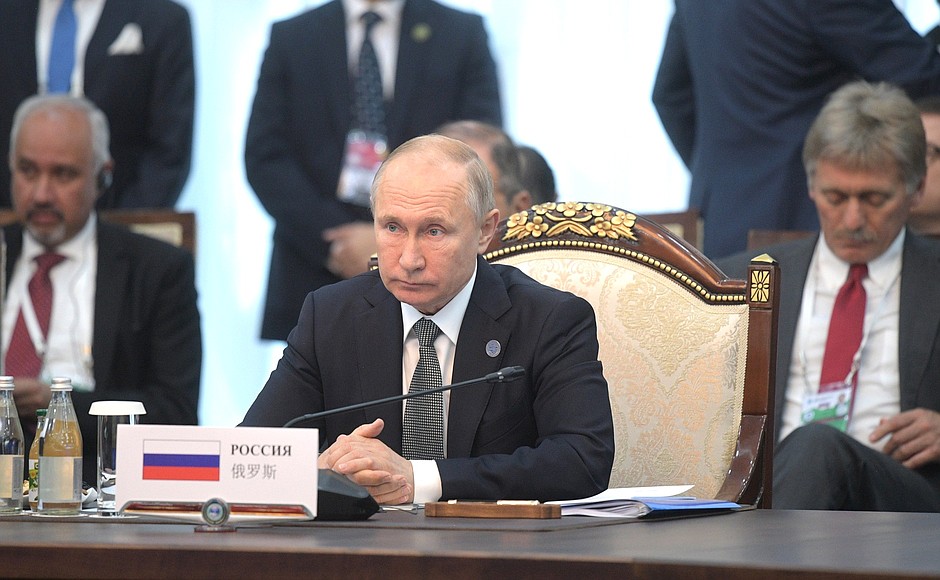
President of Russia Vladimir Putin: Mr President of Kyrgyzstan, colleagues,
I certainly agree with the positive assessments of the activities of our organisation, the SCO, which have just been voiced here. The SCO is indeed successfully developing and strengthening its positions in regional affairs, making a significant contribution to ensuring peace, security and stability in Eurasia.
Given that at the end of today's meeting, Russia will take over the Presidency of the SCO, I would like to outline Russia’s vision of the most promising areas of the organisation’s work in 2019–2020.
We believe that the fight against terrorism and extremism remains among our top priorities. We consider it important to increase cooperation within the SCO’s Regional Anti-Terrorist Structure, to cut off the financial support of terrorism through drug trafficking, and to make every effort to prevent terrorists laying their hands on chemical, biological or other weapons of mass destruction.
Russia also advocates close cooperation with the SCO member states in curbing the propaganda of terrorist and extremist ideas on the internet and the use of information and communication technologies for criminal purposes. The Concept of Cooperation of the Shanghai Cooperation Organisation Member States in Digitalisation and Information and Communication Technology, which we are approving today, is aimed at strengthening cooperation in this area.
Over the period of Russia’s Presidency, the SCO will certainly face a great deal of work to settle crises and peacefully resolve conflicts seated near the external borders of our states.
The developments in Afghanistan require special attention; my colleagues have already spoken about this here. The Afghan people need help in achieving national reconciliation and economic recovery.
We fully support the plan to expand the organisation’s security, economic and humanitarian cooperation with Afghanistan, as reflected in the relevant roadmap to be signed today. We aim to contribute in every way to the revival of the SCO-Afghanistan Contact Group’s activity.
Real results in the fight against international terrorism have been achieved in Syria. The militants have been defeated there largely due to Russia’s comprehensive assistance to the legitimate Syrian government. Damascus has regained control over most of the country’s territory. The political reconciliation process is progressing, and work is underway to set up the Constitutional Committee.
Our immediate task now is to ensure the complete elimination of hotbeds of terrorism that remain in Syria, primarily in Idlib, and at the same time to increase the volume of humanitarian aid and assistance to the economic reconstruction of Syria provided by the international community.
The Iranian nuclear programme still raises concerns. The US withdrawal from the Joint Comprehensive Plan of Action – as a reminder, it was unanimously approved by the UN Security Council in 2015 – is not only destabilising the region, but also can undermine the nuclear non-proliferation regime.
While presiding in the SCO, we intend to work to ensure that the parties to the Joint Comprehensive Plan of Action fulfil their obligations. We consider this to be the only logical and correct path.
Colleagues,
We also plan to focus on deepening the mutually beneficial economic ties between the SCO member states. In this context, we propose considering new promising projects in trade, industry, energy, infrastructure, science and technology, and innovation. The SCO Business Council and the SCO Interbank Consortium could play an important role in this work.
The expansion of mutually beneficial inter-regional trade, investment and humanitarian contacts within the SCO will certainly contribute to the development of the SCO Heads of Regions Forum, a new mechanism within the organisation. It was established at Russia’s initiative, and we propose holding the first meeting early next year.
We will continue to interact with our colleagues in the SCO to combine the integration processes being developed in Eurasia, harmonise national development strategies and regional multilateral economic projects.
We see a promising potential in integrating the Eurasian Economic Union with China’s Belt and Road project with a future aim of building a larger Eurasian partnership and an open and equal constructive cooperation space based on the principles and norms of international law without any political or economic bias, but with consideration of each other’s legitimate interests.
During Russia’s Presidency of the SCO, we will certainly pay particular attention to deepening cultural and humanitarian ties, which our colleagues have just talked about here too. In particular, we will focus on the implementation of cooperation agreements reached in the fields of media, physical fitness, sports and tourism. I fully agree with that.
Next year marks the 75th anniversary of Victory over Nazism in the Second World War. We in Russia attach great importance to preserving the memory and historical truth about this great and tragic event of the 20th century.
We are planning, also with our partners in the Commonwealth of Independent States, to organise an ambitious programme of celebrations and invite all the states represented here to take part in this work. The SCO Youth Council could also join the organising activities, which I think will be extremely beneficial for young people.
Colleagues, we will be delighted to see you at these events, including the Victory Day celebrations in Moscow.
Colleagues,
In conclusion, I would like to congratulate Kyrgyzstan on successfully completing its Presidency of the Shanghai Cooperation Organisation and say that the Russian Presidency will ensure continuity in the organisation’s work.
We invite you to the next meeting of the SCO Council of Heads of State on July 22–23, 2020 in Russia.
Thank you for your attention.
<…>